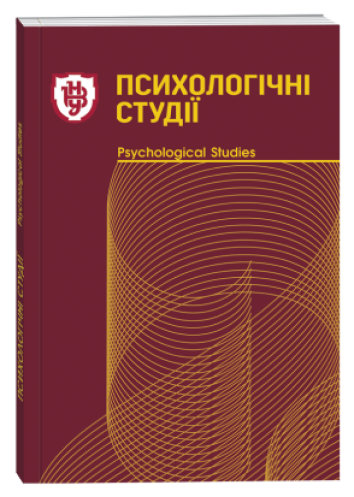PSYCHOLOGICAL ANALYSIS, THE IMPACT OF INTERPRETATION AFTER TRAUMATIC EVENTS
DOI:
https://doi.org/10.32782/psych.studies/2024.1.19Keywords:
trauma, traumatic events, traumatic memories, imprinting, interpretation of events, post-traumatic stress disorder, strategiesAbstract
The scientific article deals with the issue of psychological analysis, the influence of interpretation after traumatic events. It is noted that the psychological analysis of the interpretation of events after traumatic events is defined as a key aspect of the psychological adaptation of an individual to stressful situations. The modern approach to the study of this phenomenon takes into account not only the process of interpretation itself, but also its impact on mental health and the general state of the individual. The purpose of the study was to conduct an in-depth psychological analysis of the process of interpreting events that occurs in the human psyche after traumatic situations, to determine effective psychotherapeutic strategies for alleviating the consequences of traumatic events. The research is marked by scientific novelty due to the use of an integrative approach to the analysis of mental processes, which includes the impact of interpretation on mental health, taking into account individual and sociocultural aspects of the formation of interpretive models after traumatic events. The obtained results testify to the significant influence of the interpretation of events on the mental state of a person, on his emotions and memory. Understanding this process can contribute to the development of effective psychotherapeutic strategies to alleviate the effects of traumatic events and improve the quality of life of those who have experienced stress. Based on the research, psychotherapeutic strategies have been implemented to alleviate the consequences of traumatic events, which have helped people achieve positive results: cognitive- behavioral therapy, which helps clients recognize and change negative thoughts and behaviors related to the trauma; emotional-motor desensitization and processing, which is specially developed for the treatment of PTSD; psychodynamic therapy, which is focused on understanding unknown aspects of personality and how past experiences can affect current functioning; systemic therapy, which is particularly effective for working with relationships and family systems that may have been affected by a traumatic event; mindfulness approaches, which include mindfulness and mindfulness practices aimed at reducing stress and improving emotional regulation; group therapy, which can help clients with trauma feel supported and understood by others who have also been through similar experiences.
References
Ван дер Колк Б. Тіло веде лік. Як залишити психотравми в минулому. К.: Vivat. 2022. 624 c.
Герасименко Л. О., Герасименко Л. А. Посттравматичний стресовий розлад. Neyronews. № 8. 2021. C. 27–32. URL: http://surl.li/osell.
Герман Дж. Психологічна травма та шлях до видужання. Львів : Вид-во Старого Лева, 2022. 416 с.
Кондратюк С. М. Загальна психологія : навчально-методичний посібник. Київ : ТАЛ-КОМ, 2018. 209 с.
Кучманич І., Мороз Р. Психологічний механізм виникнення та перебігу психологічної травми в особистості. Збірник наукових праць «Проблеми сучасної психології». 2017. № 36. URL: http://surl.li/osevq.
Мартіна Мюллер. Якщо ви пережили психотравмуючу подію / пер. з англ. Діана Бусько; наук. ред. Катерина Явна. (Серія «Сам собі психотерапевт»). Львів: Видавництво Українського католицького університету: Свічадо, 2014. 120 с.
Посттравматичні стресові розлади : навчальний посібник / Під заг. ред. проф. Б. В. Михайлова. Вид. 2-е, перероблене та доповнене. Харків: ХМАПО, 2014. 223 с.
Сандал О. С. Психотравмувальні події як чинник травматичного досвіду особистості. Науковий вісник Херсонського державного університету. Серія «Психологічні науки». 2021. № 2. С. 49–62.







